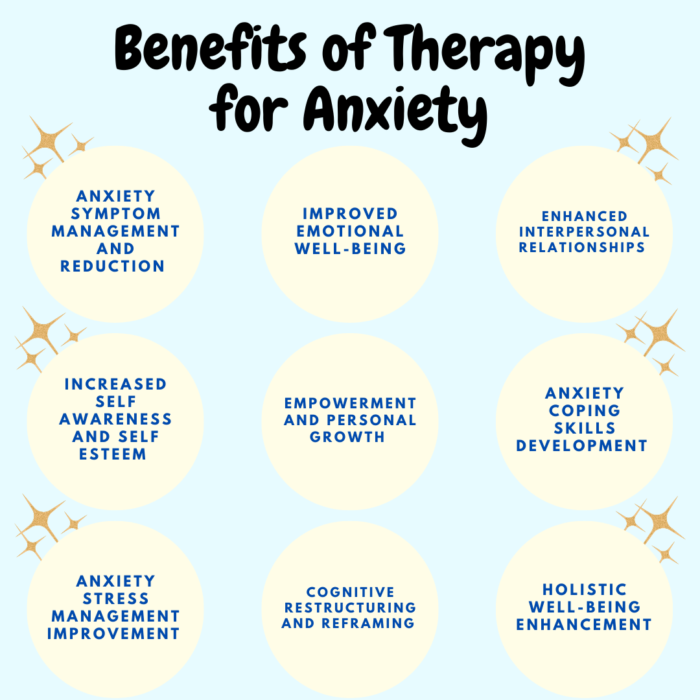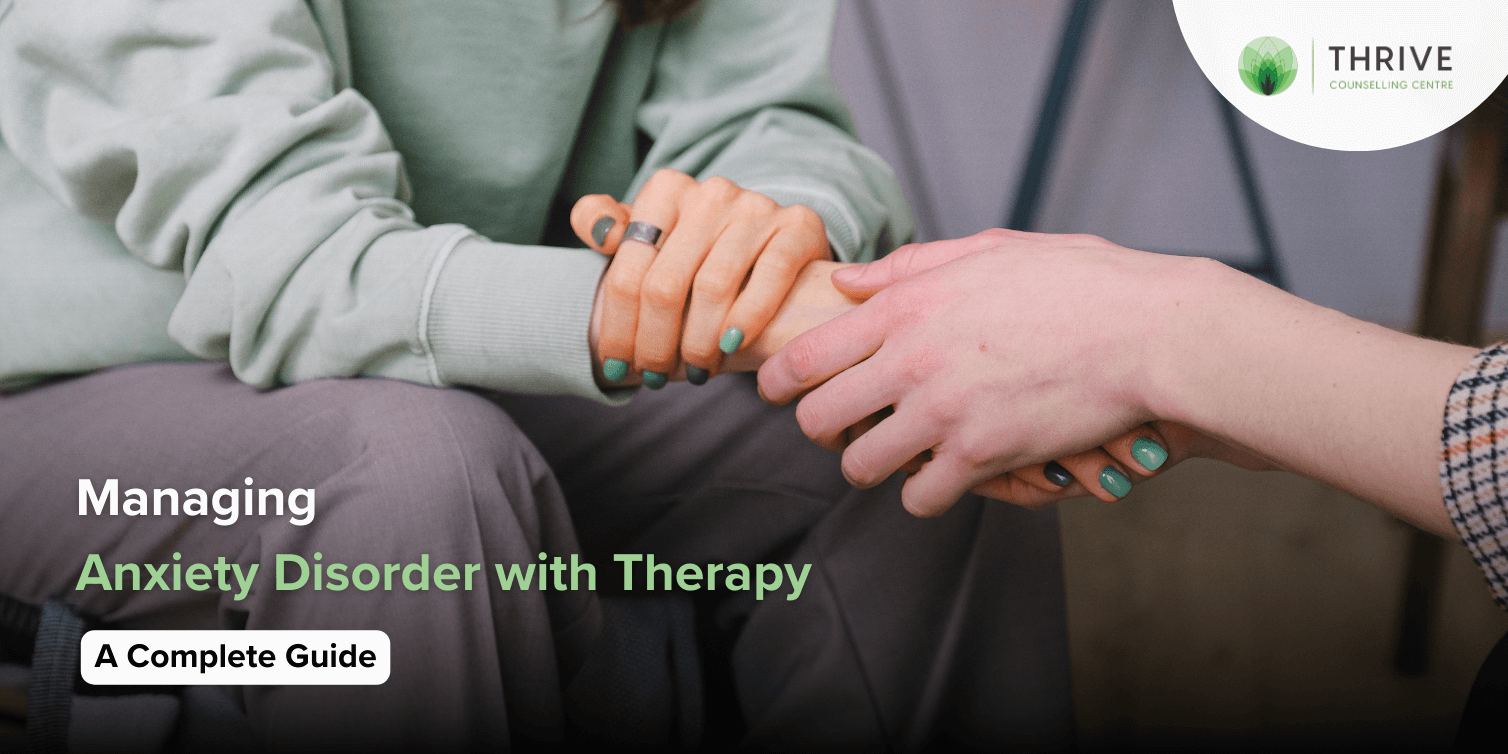Scientifically supported counselling for anxiety with empathetic guidance
Wiki Article
Exploring Different Strategies in Coaching for Stress And Anxiety Condition for Lasting Modification
When dealing with anxiety problems, it's important to discover a variety of therapy methods. Each approach uses distinct understandings and tools to help you handle your signs effectively. You may locate that incorporating techniques can yield the very best results. Nevertheless, recognizing the subtleties of these methods is vital to cultivating lasting adjustment. What happens if the appropriate combination could release a new degree of psychological wellness for you?Recognizing Anxiety Disorders: A Quick Introduction
Anxiety conditions, which influence numerous individuals worldwide, can substantially affect day-to-day live. You could experience overwhelming feelings of concern or stress that appear unmanageable. These feelings can lead to physical signs like an auto racing heart, sweating, and even lightheadedness. Usual sorts of stress and anxiety disorders consist of generalised anxiety problem, panic disorder, and social stress and anxiety disorder. Each has distinct indications, yet they all share a propensity to interrupt your regular and relationships.Understanding the source of your stress and anxiety is crucial. It may come from genes, mind chemistry, or life experiences. Acknowledging your triggers can assist you manage your feedbacks better. It is very important to bear in mind that you're not alone in this struggle. Lots of people face comparable difficulties, and seeking aid is a solid action toward feeling better. By learning about anxiousness disorders, you're currently on the path to understanding and handling your condition better.Cognitive-Behavioral Treatment: Challenging Unfavorable Idea Patterns

Determining Negative Idea Triggers
When you encounter minutes of distress, acknowledging the particular triggers behind your negative thoughts can be crucial in handling stress and anxiety. Begin by taking notice of scenarios that prompt sensations of fear or anxiety. Is it a jampacked area, an upcoming due date, or a discussion with certain people? Write down these circumstances in a journal. This will certainly help you recognize patterns in your reasoning. Also, notification physical feelings that accompany your unfavorable thoughts, like a racing heart or rigidity in your breast. By identifying these triggers, you acquire understanding right into what's sustaining your anxiety. Comprehending these connections is the initial step in challenging those thoughts and ultimately gaining back control over your emotional responses.
Replacing Thoughts With Positives
Challenging adverse thought patterns is a vital action in changing your frame of mind and reducing stress and anxiety. You might frequently locate on your own trapped in cycles of self-doubt or devastating reasoning. Rather of allowing these ideas dictate your feelings, method changing them with favorable affirmations or realistic alternatives. When you assume, "I can not handle this," change it to, "I can handle difficulties one action at a time." This easy modification can greatly impact your emotional state. Consistently recognizing and responding to these adverse ideas helps produce a much healthier inner discussion. Keep in mind, it requires time and initiative, however regularly exercising this technique can result in enduring modification, equipping you to deal with anxiety with restored self-confidence and strength
Building Coping Techniques Together
Changing adverse ideas is just the start of taking care of anxiety properly. To create long lasting change, you need to develop coping approaches that equip you. Cognitive-Behavioral Treatment (CBT) aids you recognize and test those unhelpful thought patterns. Together, you and your therapist can discover just how these ideas impact your sensations and behaviors.Start by creating useful techniques, like journaling or mindfulness exercises, that enable you to confront stress and anxiety head-on. When you face your concerns gradually, you'll discover to react in different ways.
Mindfulness and Acceptance-Based Approaches: Growing Present-Moment Recognition
As you navigate the complexities of stress and anxiety, incorporating mindfulness and acceptance-based techniques can significantly boost your ability to grow present-moment recognition. By concentrating on the present moment, you'll discover that you can observe your ideas and sensations without judgment. This practice aids you recognize your stress and anxiety without feeling bewildered by it.Engaging in mindfulness exercises, such as deep breathing, body scans, or guided reflections, allows you to ground yourself in your present experience. Acceptance-based methods urge you to welcome your feelings instead of combat against them. They shed their power over you.Incorporating these methods right into your daily regimen can transform just how you react to anxiety when you accept your sensations. You'll establish resilience and find out to navigate demanding situations with greater simplicity. Inevitably, growing present-moment awareness lays the foundation for lasting modification, equipping you to lead a much more satisfying life.Exposure Therapy: Facing Concerns Progressively
Direct exposure therapy helps you confront your fears in a gradual method, making it much less overwhelming. You'll learn techniques to encounter anxiety-provoking scenarios detailed, while additionally building coping strategies to manage your reactions. This strategy encourages you to take control and reduce anxiousness gradually.Steady Direct Exposure Methods
When dealing with stress and anxiety, gradually challenging your concerns can be a powerful means to gain back control. This technique, referred to as progressive exposure, entails gradually subjecting yourself to the situations or things that cause your anxiousness. Start with less daunting situations and gradually function your method up to even more challenging ones. For instance, if you're afraid of public speaking, you could start by talking in front of a mirror, then progress to sharing thoughts with a close friend, and eventually resolve a little team. Each step assists desensitize you to the anxiety, developing your self-confidence over time. Keep in mind, it's important to rate yourself and celebrate tiny victories as you relocate with this process, reinforcing your capacity to manage anxiousness efficiently.Structure Coping Approaches
Structure effective coping techniques is essential for handling anxiousness, particularly as you confront your worries progressively. One effective approach is direct exposure therapy, where you begin by encountering your worries in a controlled way. Start with much less frightening scenarios and gradually function your means approximately more challenging situations. This steady exposure assists desensitize you to anxiety sets off, making them much less overwhelming.Incorporate leisure techniques, such as deep breathing or mindfulness, to soothe your mind during direct exposure. Track your progress, celebrating little triumphes along the road to improve your self-confidence. Bear in mind, it's okay to take your time; the goal isn't perfection yet constant improvement. By constructing these methods, you'll encourage yourself to browse stress and anxiety and embrace life much more totally.Psychodynamic Treatment: Discovering Origin of Anxiety
Psychodynamic treatment discovers the unconscious mind, revealing the source of your stress and anxiety - Counseling services for anxiety. By examining your ideas, sensations, and past experiences, this method helps you reveal underlying disputes and unresolved concerns that may contribute to your present stress and anxiety. You'll function with a therapist to investigate youth experiences, relationships, and emotional patterns that form your reactions today.As you obtain insight into these deeper layers of your psyche, you'll start to acknowledge how previous occasions influence your existing habits. This understanding can cause catharsis, permitting you to refine emotions you might have suppressed.Through the healing relationship, you can additionally recognize defense devices that might have created gradually, offering a more clear path to alter. Ultimately, psychodynamic therapy outfits you with the tools to address your anxiousness at its core, advertising long lasting makeover in your emotional wellnessIntegrative and Alternative Techniques: Integrating Strategies for Greater Efficiency
Integrating numerous restorative techniques can enhance your trip towards managing anxiety a lot more properly. By combining elements from cognitive-behavioral therapy, mindfulness practices, and alternative techniques, you can develop an individualized approach that addresses your distinct requirements. You could use cognitive-behavioral methods to test adverse idea patterns while integrating mindfulness exercises to ground on your own in the present moment.Additionally, exploring holistic techniques such as yoga exercise or meditation can promote leisure and minimize anxiousness signs. This blend allows you to develop greater self-awareness and resilience.Experimenting with these diverse methods can help you discover what reverberates most with you. Bear in mind, it's about locating a harmony that functions, rather than staying with a solitary method. This integrative method not only offers prompt alleviation yet additionally cultivates lasting skills for managing anxiousness, encouraging you to recover control over your life.The Role of Assistance Solutions: Building Resilience Through Connection
While it may seem that handling anxiety is a solitary journey, having a solid support group can play a crucial function in your resilience. Surrounding on your own with compassionate friends, family members, or support system develops a safe area where you can openly share your feelings and experiences. You remind yourself that you're not alone in this struggle.These connections use inspiration and can offer functional coping approaches that have worked for others when you link with others. It's likewise an opportunity to obtain perspective; good friends can aid you see situations differently, lowering sensations of isolation.Moreover, psychological support promotes a feeling of belonging, which can greatly ease anxiety signs and symptoms. By leaning on your support group, you can develop resilience and tackle challenges extra successfully. Remember, reaching out for assistance signifies stamina, and it can make all the difference in your trip towards taking care of anxiousness.Frequently Asked Inquiries
What Are the Typical Signs And Symptoms of Anxiousness Disorders?
You may experience restlessness, exhaustion, difficulty concentrating, irritability, muscle mass stress, and sleep disturbances. Physical symptoms can include fast heart beat, sweating, and shivering. Acknowledging these indications early can assist you seek ideal support and therapy.
How Lengthy Does Therapy Usually Last for Stress And Anxiety Disorders?
Therapy for anxiousness problems generally lasts anywhere from a couple of weeks to a number of months. It really depends upon your individual requirements, progress, and the strategies your therapist utilizes to help you handle your anxiety effectively.Can Medicine Be Used Alongside Treatment for Anxiety?
Yes, medicine can certainly be made use of along with treatment for anxiousness. Incorporating both methods frequently enhances treatment efficiency, aiding you manage signs and symptoms while exploring underlying problems with therapy. Always consult your more info doctor for individualized advice.Exist Self-Help Techniques for Managing Stress And Anxiety?
Yes, there are several self-help methods for taking care of anxiousness. You can practice mindfulness, participate in routine exercise, keep a well balanced diet regimen, develop a regular, and utilize deep breathing techniques to assist minimize anxiousness symptoms efficiently.Just how Do I Know if I Need Specialist Aid for Anxiety?
You should consider seeking professional help for anxiety if it disrupts everyday life, creates significant distress, or if self-help techniques aren't functioning. Trust your instincts; getting to out can lead to better coping skills and support. Typical types of anxiety disorders consist of generalised anxiety disorder, panic problem, and social anxiousness condition. When you come across moments of distress, recognizing the specific triggers behind your negative ideas can be important in managing stress and anxiety. Changing unfavorable ideas is just the beginning of managing stress and anxiety efficiently. By examining your thoughts, sensations, and previous experiences, this technique aids you reveal underlying conflicts and unsettled issues that may contribute to your current anxiousness. It's likewise a chance to get point of view; pals can help you see circumstances differently, lowering feelings of isolation (Counseling services for anxiety).Moreover, emotional assistance promotes a feeling of belonging, which can significantly alleviate anxiety signsReport this wiki page